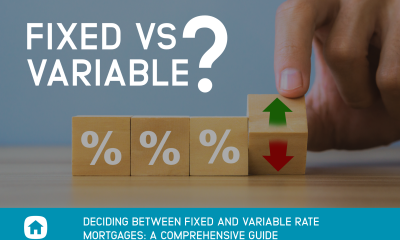(Special) – Getting a mortgage is, and has been, challenging for self-employed Canadians for many years due to the fact that their incomes tend to be low and often sporadic and fluctuating. In many cases, they will have to take mortgage insurance in order to get the financing to buy a home.
Mortgage default insurance is mandatory in Canada for down payments of between five per cent (the minimum down payment required in Canada) and 19.99 per cent. Mortgage insurance, available through Canada Mortgage and Housing Corporation (CMHC) and some other financial lenders, protects lenders in the event borrowers stop making their mortgage payments and default on their mortgage loans.
There are some requirements to qualify for the insurance. The maximum amortization for insured mortgages is 25 years. A minimum down payment of five per cent is required for a purchase price of $500,000 or less. For a purchase price between $500,000 and $999,999 the minimum down payment is five per cent for the first $500,000 and 10 per cent on the remainder. Mortgage insurance is for first-time home buyers. It is not available on homes purchased for more than $1 million, in which case a 20 per cent down payment is required.
Although mortgage default insurance costs home buyers between 2.8 per cent and four per cent of their mortgage amount, it does allow many Canadians who might not otherwise be able to purchase homes access to the Canadian real estate market. Without it, mortgages rates would be higher because the risk of default is higher. With mortgage insurance, lenders are able to offer lower mortgage rates because the risk of default is passed along to the insurer.
According to CMHC, self-employed people make up about 15 per cent of Canada’s population. Some studies have predicted this number could increase to 45 per cent by 2020 as the world of work changes, with technology reducing employment and more and more people becoming self-employed or working part-time.
“We are seeing a lot of young workers and professionals going into the self-employed market and finding it hard to get mortgages given the high costs of housing, particularly in major centres,” David Lee, a financial adviser with BlueShore Financial in Vancouver, said in an interview. “Real estate has become very expensive compared to what it was even 15 years ago.”
Effective Oct. 1, self-employed borrowers will only be required to have been operating their business or been in the same line of work for less than two years.
“Most mortgage insurance programs require that the individual has to have been in business or worked in the same business for at least two years — lenders want to see that the person has a track record in the business,” Lee says. “This change will give people who have recently entered the self-employed market a lot more flexibility in getting a mortgage.”
The changes also expand the scope of documents that mortgage applicants can use to validate their income to include the T1 general tax form, proof of income statement from the Canada Revenue Agency and form T2125 statement of business and professional activities, aside from the notice of assessment and audited and unaudited financial statements prepared by an independent third party.
BlueShore recommends applicants maintain a strong credit score, file tax returns on time and pay any tax owing, reduce their debt-to-income ratio and build up cash reserves of two months or more to make the approval process for a mortgage as easy as possible.
Lee recommends people plan their application in advance to make the process as easy as possible and increase their chances of success.
“Have a business plan, set aside money to cover any unpredictability in your income, pay off debt, loans and any big purchases, and work with a lender who understands your business and can help you structure your finances and prepare you to handle your mortgage down the road,” Lee says.
Talbot Boggs is a Toronto-based business communications professional who has worked with national news organizations, magazines and corporations in the finance, retail, manufacturing and other industrial sectors.
Copyright 2018 Talbot Boggs
Talbot Boggs , The Canadian Press

 Buying a Home5 years ago
Buying a Home5 years ago
 Credit6 years ago
Credit6 years ago
 Business4 years ago
Business4 years ago
 5 Mortgage Secrets7 years ago
5 Mortgage Secrets7 years ago
 Buying a Home6 years ago
Buying a Home6 years ago
 5 Mortgage Secrets6 years ago
5 Mortgage Secrets6 years ago
 News12 months ago
News12 months ago
 Business4 years ago
Business4 years ago





